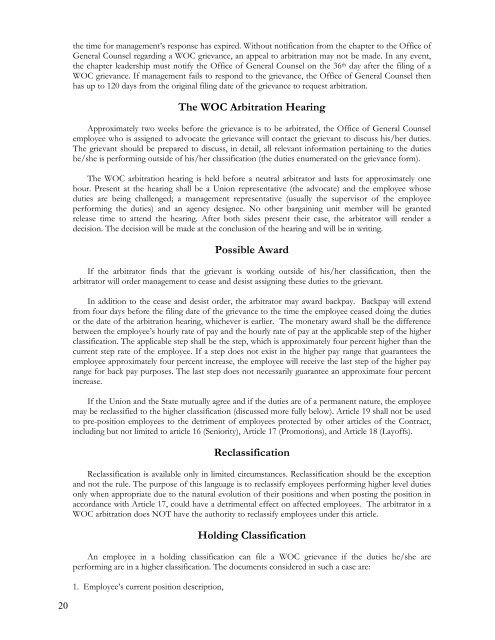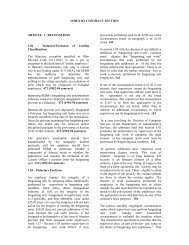Download the Grievance Guide - OCSEA
Download the Grievance Guide - OCSEA
Download the Grievance Guide - OCSEA
Create successful ePaper yourself
Turn your PDF publications into a flip-book with our unique Google optimized e-Paper software.
<strong>the</strong> time for management’s response has expired. Without notification from <strong>the</strong> chapter to <strong>the</strong> Office of<br />
General Counsel regarding a WOC grievance, an appeal to arbitration may not be made. In any event,<br />
<strong>the</strong> chapter leadership must notify <strong>the</strong> Office of General Counsel on <strong>the</strong> 36 th day after <strong>the</strong> filing of a<br />
WOC grievance. If management fails to respond to <strong>the</strong> grievance, <strong>the</strong> Office of General Counsel <strong>the</strong>n<br />
has up to 120 days from <strong>the</strong> original filing date of <strong>the</strong> grievance to request arbitration.<br />
The WOC Arbitration Hearing<br />
Approximately two weeks before <strong>the</strong> grievance is to be arbitrated, <strong>the</strong> Office of General Counsel<br />
employee who is assigned to advocate <strong>the</strong> grievance will contact <strong>the</strong> grievant to discuss his/her duties.<br />
The grievant should be prepared to discuss, in detail, all relevant information pertaining to <strong>the</strong> duties<br />
he/she is performing outside of his/her classification (<strong>the</strong> duties enumerated on <strong>the</strong> grievance form).<br />
The WOC arbitration hearing is held before a neutral arbitrator and lasts for approximately one<br />
hour. Present at <strong>the</strong> hearing shall be a Union representative (<strong>the</strong> advocate) and <strong>the</strong> employee whose<br />
duties are being challenged; a management representative (usually <strong>the</strong> supervisor of <strong>the</strong> employee<br />
performing <strong>the</strong> duties) and an agency designee. No o<strong>the</strong>r bargaining unit member will be granted<br />
release time to attend <strong>the</strong> hearing. After both sides present <strong>the</strong>ir case, <strong>the</strong> arbitrator will render a<br />
decision. The decision will be made at <strong>the</strong> conclusion of <strong>the</strong> hearing and will be in writing.<br />
Possible Award<br />
If <strong>the</strong> arbitrator finds that <strong>the</strong> grievant is working outside of his/her classification, <strong>the</strong>n <strong>the</strong><br />
arbitrator will order management to cease and desist assigning <strong>the</strong>se duties to <strong>the</strong> grievant.<br />
In addition to <strong>the</strong> cease and desist order, <strong>the</strong> arbitrator may award backpay. Backpay will extend<br />
from four days before <strong>the</strong> filing date of <strong>the</strong> grievance to <strong>the</strong> time <strong>the</strong> employee ceased doing <strong>the</strong> duties<br />
or <strong>the</strong> date of <strong>the</strong> arbitration hearing, whichever is earlier. The monetary award shall be <strong>the</strong> difference<br />
between <strong>the</strong> employee’s hourly rate of pay and <strong>the</strong> hourly rate of pay at <strong>the</strong> applicable step of <strong>the</strong> higher<br />
classification. The applicable step shall be <strong>the</strong> step, which is approximately four percent higher than <strong>the</strong><br />
current step rate of <strong>the</strong> employee. If a step does not exist in <strong>the</strong> higher pay range that guarantees <strong>the</strong><br />
employee approximately four percent increase, <strong>the</strong> employee will receive <strong>the</strong> last step of <strong>the</strong> higher pay<br />
range for back pay purposes. The last step does not necessarily guarantee an approximate four percent<br />
increase.<br />
If <strong>the</strong> Union and <strong>the</strong> State mutually agree and if <strong>the</strong> duties are of a permanent nature, <strong>the</strong> employee<br />
may be reclassified to <strong>the</strong> higher classification (discussed more fully below). Article 19 shall not be used<br />
to pre-position employees to <strong>the</strong> detriment of employees protected by o<strong>the</strong>r articles of <strong>the</strong> Contract,<br />
including but not limited to article 16 (Seniority), Article 17 (Promotions), and Article 18 (Layoffs).<br />
Reclassification<br />
Reclassification is available only in limited circumstances. Reclassification should be <strong>the</strong> exception<br />
and not <strong>the</strong> rule. The purpose of this language is to reclassify employees performing higher level duties<br />
only when appropriate due to <strong>the</strong> natural evolution of <strong>the</strong>ir positions and when posting <strong>the</strong> position in<br />
accordance with Article 17, could have a detrimental effect on affected employees. The arbitrator in a<br />
WOC arbitration does NOT have <strong>the</strong> authority to reclassify employees under this article.<br />
Holding Classification<br />
An employee in a holding classification can file a WOC grievance if <strong>the</strong> duties he/she are<br />
performing are in a higher classification. The documents considered in such a case are:<br />
1. Employee’s current position description,<br />
20

















